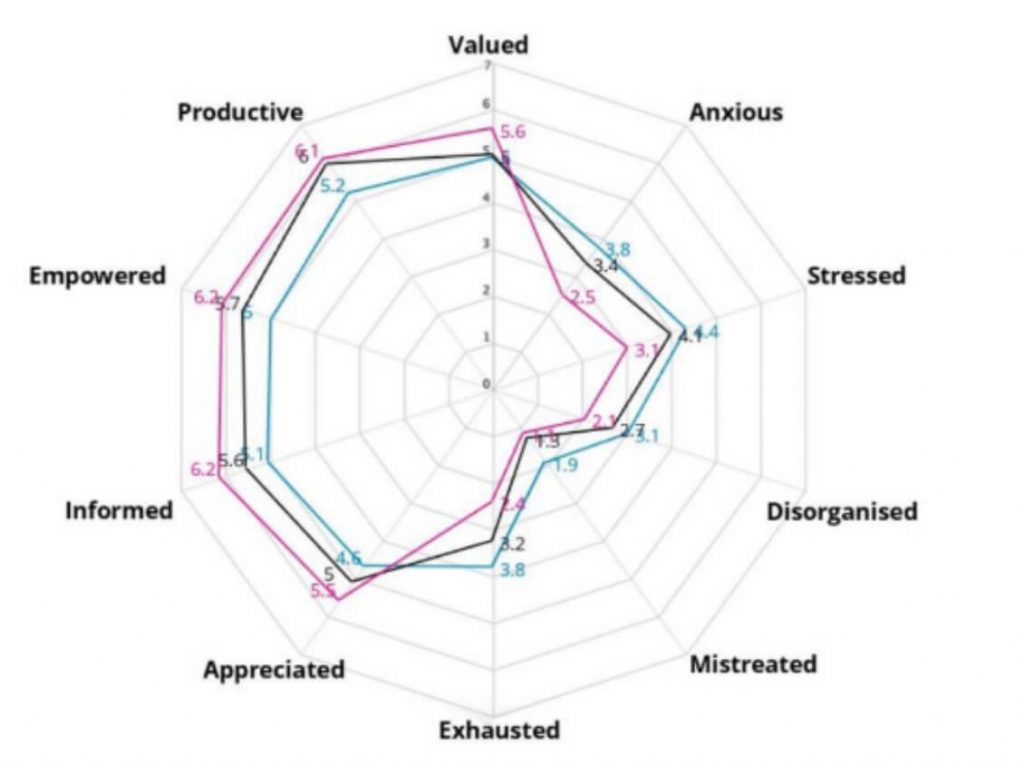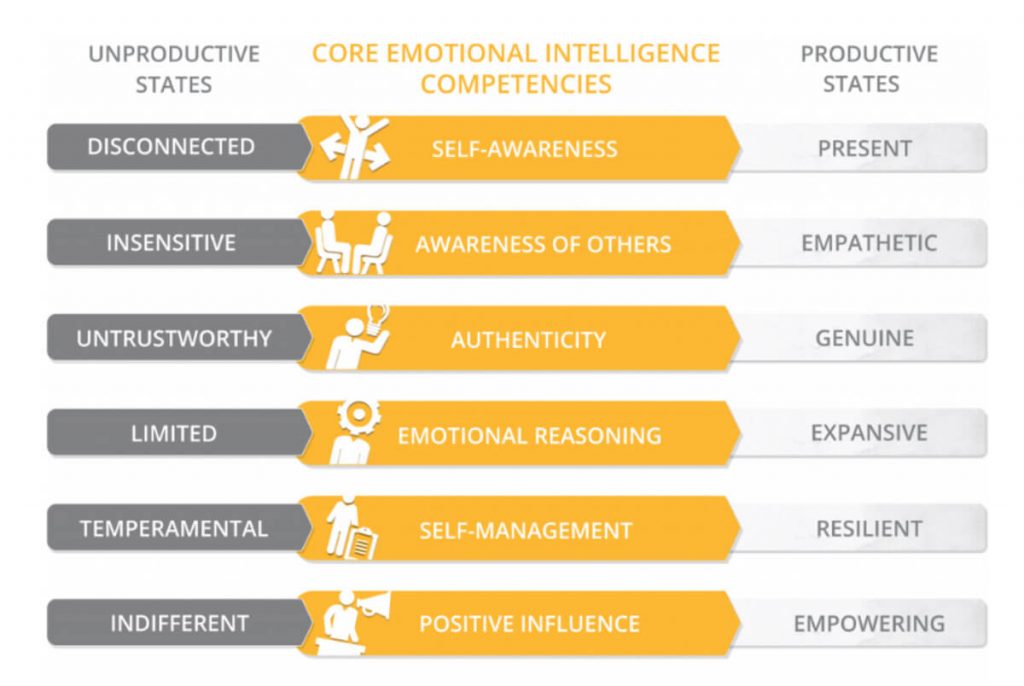Everyone has emotions. It is a simple fact – a part of our being human. And whether we realize it or not, these emotions impact us every day. They also impact those around us, both in the workplace and in our personal lives.
What is Emotional Intelligence?
Emotional Intelligence (EI) is a set of skills that help us better perceive, understand, and manage emotions in ourselves and others. Collectively they help us make intelligent responses to, and use of, emotions. These skills are as critical as your intellect (IQ) in determining success in work and life. Everyone, no matter what job function, has interactions with other people. Your capacity to understand your emotions, to be aware of them and how they impact the way you behave and relate to others, will improve your people skills, and help you become more satisfied and successful.
Who wouldn’t want a higher level of emotional intelligence?
Studies have shown that high levels of emotional intelligence boost career success, mental health, personal and professional relationships, and happiness. Higher levels of Emotionally Intelligent Workplace Behavior are also the best antidote to work stress and building your personal resilience. Learn how you can improve your emotional intelligence.
Genos International is a leading emotional intelligence provider with one of the widest ranges of emotional intelligence assessments on the market. Genos emotional intelligence is about being smart in how we respond to and manage emotions. Genos practitioners collaborate with individuals and teams to develop and apply emotional intelligence at work so people can better connect, communicate, and collaborate. This enables our clients to overcome their biggest organizational challenges.
Genos gives organizations the ability to work with emotional intelligence in a variety of ways. From developing agile leaders, engaging millennial workforces, to helping individuals become more self-aware, Genos emotional intelligence assessments and programs can transform the lives of your workforce.
AREAS OF FOCUS:
- Improving leadership and culture
- Delivering transformational change
- Collaborating more effectively in teams
- Increasing sales performance and customer service
- Building mentally healthy workplaces
- Developing more emotionally intelligent leaders
DEVELOPING MORE EMOTIONALLY INTELLIGENT LEADERS
Great leaders have great people skills. Genos uses neuroscience and emotional intelligence to help leaders better connect, influence, and inspire others. The result is better productivity combined with a more positive and healthier workplace culture. There is a direct link between the way people feel and the way they perform at work. Research has proven that a leader’s emotional intelligence is key to their capacity to facilitate emotions in others that drive high performance and employee engagement. This is more than just a moral compass; it is also a recipe for success. Organizations with emotionally intelligent leaders achieve a sustainable competitive advantage, a high-performance culture and customer loyalty.

WHAT’S THE EMOTIONAL CULTURE OF YOUR ORGANIZATION?
We all experience a wide range of feelings at work. These influence our decisions, behavior, and performance. Check the pulse of your organization with the ECI.
The Genos Emotional Culture Index measures current expected and ideal emotions at work to help identify areas of focus in developing teams and culture. Quick, easy to use and customizable to your organization.
Applied Emotional Intelligence – The Difference It Makes
In the workplace, emotional intelligence underlies our self-awareness, empathy, leadership, and resilience. In our world of ‘do more with less’, where continuous change is the norm and effective collaboration is essential, these skills are fundamental to our success. People who have been through our programs feel better at work, facilitate more productive work environments, and better lead and engage others.
The Genos Workplace Model comprises of a set of emotionally intelligent workplace behavior competencies. Competencies represent skills and behaviors, based on underlying abilities and experiences, which are measurable and observable. The Genos model looks at demonstrated emotional intelligence.

GENOS MODEL BEHAVIORS OVERVIEW
Self-Awareness
Self-Awareness is about being aware of the way you feel and the impact your feelings can have on decisions, behavior, and performance. Emotionally self-aware people are conscious of the role their feelings can play in these areas and are better equipped to manage this influence effectively. When we are emotionally self-aware, we are present with the role feelings are playing in our decisions, behavior, and performance. When we are not, we are often disconnected from this influence.
Awareness of Others
Awareness of others is about perceiving, understanding, and acknowledging the way others feel. This skill helps us identify the things that make people feel valued, listened to, cared for, consulted, and understood. It also helps us demonstrate empathy, anticipate responses or reactions, and adjust our behaviour so that it fits well with others. When we demonstrate this skill effectively, we come across as being empathetic. People who do not display this skill can come across as being insensitive to the way others feel.
Authenticity
Authenticity is about openly and effectively expressing oneself, honoring commitments and encouraging this behavior in others. It involves honestly expressing specific feelings at work, such as happiness and frustration, providing feedback to colleagues about the way you feel, and sharing emotions at the right time, to the right degree and, to the right people. People high in authenticity are often described as genuine, whereas people low in this skill are often described as untrustworthy.
Emotional Reasoning
Emotional reasoning is about using the information in feelings (from oneself and others) when decision-making. It involves considering your own and others’ feelings when making decisions, combining the information in feelings with facts and technical information, and communicating this decision-making process to others. Feelings and emotions contain essential information. For example, the level of commitment colleagues demonstrate often provides insight into whether a decision is going to be supported by others; the emotional appeal of products and services often provides insight into selling and marketing messages. When this type of emotional information is combined with facts and technical information, people make expansive, creative, and well-thought-out decisions. Conversely, people who do not use emotional information and focus on facts or technical information only tend to be limited in their decision-making.
Self-Management
Self-Management is about managing one’s own mood and emotions, time, and behavior, and continuously improving oneself. The modern workplace is one of high demands and pressure, and this can create negative emotions and outcomes. Our mood can be very infectious and can therefore be a powerful force in the workplace; productively or unproductively. This skill helps people be resilient and manage high work demands and stress rather than being temperamental at work. People who are proficient in managing their own emotions are optimistic and look to find the opportunities and possibilities that exist even in the face of adversity.
Positive Influence
Positive influence is about positively influencing the way others feel through problem solving, feedback, recognising and supporting others work. It involves creating a positive working environment for others, helping others find effective ways of responding to upsetting events and effectively helping people resolve issues that are affecting their performance. This skill helps people create a productive environment for others. Positive Influence equips you with the capacity to encourage colleagues to cooperate and work effectively together. People who can positively influence others’ moods, feelings and emotions are empowering to work with and easily motivate those around them.
GENOS PROGRAMS & ACTIVITIES
Our programs transfer cutting-edge content, assessments, frameworks, and tools into practical behavioral change that endures and has impact. The programs present a comprehensive approach to development by improving both foundational and functional skills for the modern workplace. Most of the material can be applied within and outside of the workplace. That is why we call them game-changing for business and life-changing for people. Our programs have been expertly designed, assessed, and shown to deliver tangible improvements in business outcomes. Contact me to learn more.- Leading with Emotional Intelligence
- The Emotionally Intelligent Leader
- The Mindful Leader
- The Resilient Leader
- The Engaging Leader
- The Emotionally Intelligent Salesperson
- Applied Emotional Intelligence
- The EI Experience



